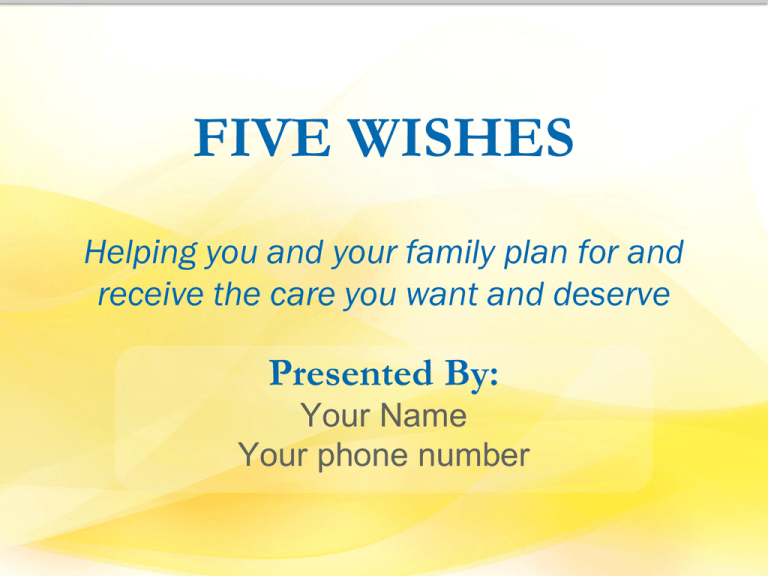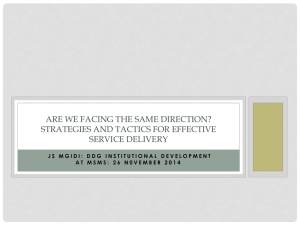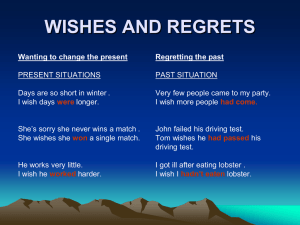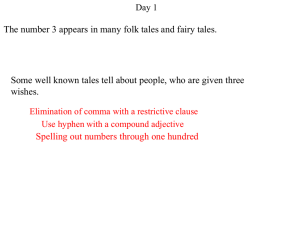Five Wishes: Advance Care Planning Presentation
advertisement

FIVE WISHES Helping you and your family plan for and receive the care you want and deserve Presented By: Your Name Your phone number This Presentation Will Cover: •Practical •How steps to make your wishes known and honored to be there for your loved ones when needed the most •Follow-up steps for communicating your wishes to others • National Non-Profit Founded in 1996 • Inspired by Mother Teresa of Calcutta • Helps People Plan For And Receive The Care They Want In Case Of Serious Illness • Over 23 Million in Circulation in 28 Languages What People Want: • To die at home • To be free from pain • To be in the company of loved ones • To retain control of the care we receive The Contrast of Reality • Less than 25 percent of Americans die at home, although more than 70 percent say that is their wish • Dying is often unnecessarily painful and isolating • Only 20 to 30 percent of the population has completed an advance directive The Reason for this Stark Reality Doctors aren’t aware of their patients’ wishes. A major 2007 study found that only 25% of physicians knew that their patients had advance directives on file. The Reason for this Stark Reality The end of life is often treated only as a medical moment. A Solution: • Simple format • Everyday language • Promotes peace of mind Helping Your Family Avoid Guessing & Guilt • Get the care you want and deserve •First living will to address personal, emotional and spiritual needs, along with medical wishes •Created with help of American Bar Association and health care experts •Distributed by Aging with Dignity and a network of 35,000 organizations A Tool to Promote Human Dignity •People don’t want to be an object on a medical care “conveyor belt” •Sometimes medicine doesn’t know when to stop •Five Wishes helps you to communicate what you want – or don’t want •Guides discussions with your loved ones and physician Recognized Nationally Meets Legal Requirements In 42 States and Washington, D.C.* *a complete listing can be found inside your If you don’t live in a state •Five Wishes does not meet current technical requirements in 8 states. •Laws in these states require mandatory and often complicated forms. •Residents often find it helpful to complete Five Wishes as an attachment. •Many people in these states say Five Wishes expresses their intentions in detail and provides a helpful guide for caregivers. addresses: 1. Which person you want to make health care decisions for you when you can’t make them yourself 2. The kind of medical treatment you want or don’t want 3. How comfortable you want to be 4. How you want people to treat you 5. What you want your loved ones to know The Person You Want To Make Health Care Decisions For You When You Can’t •Allows you to name a person to act on your behalf Legally Your Durable Power of Attorney for Healthcare Often Known as a Health Care Agent The Kind Of Medical Treatment You Want Or Don’t Want •Commonly known as a “living will” •Expresses instructions for your caregiver, such as the need to take medicine for pain, even if it leaves you sleepy •Includes examples of life support •Gives space to write instructions based on personal beliefs is not a Do Not Resuscitate Order •Medical staff may look for a “DNR” form or bracelet during emergency situations. •The form shows that you don’t want life support treatment when you are dying •Many states require the form to be filled out and signed by a doctor •Check with your doctor for more information How Comfortable You Want To Be •Stresses that you want your pain managed •Expresses your choices for types of comfort care •You cross out or keep items based on your preferences I do not want to be in pain. I want my doctor to give me enough medicine to relieve my pain, even if that means I will be drowsy or sleep more than I would otherwise. I wish to have my favorite music played when possible until my time of death. How You Want People To Treat You •What others should keep in mind if you become seriously ill •Whether you want to have people around or your hand held when possible •If you want prayers said for you •Ideas for your surroundings, such as pictures of loved ones What You Want Your Loved Ones To Know •Encourages you to express matters of deep importance in an age where families often live apart •Allows you to offer love and forgiveness to those who have hurt you •Asks forgiveness for times you have hurt others •Communicates practical matters such as preferences for memorial or burial Signing •Print your name •Read the statement carefully •Ask two witnesses to be present (see witness statement) •Sign Five Wishes in front of witnesses •Witnesses don’t have to read your wishes After Completing •Make copies of your completed Five Wishes for your family, friends, Health Care Agent and doctor •Discuss your wishes •Keep it available (in your top drawer, not your safe deposit box) •Carry your wallet card Additional Resources •Five Wishes DVD: designed to help present Five Wishes to groups or families •Next Steps Guide: a companion booklet to Five Wishes, with conversation starters, commonly asked questions and answers, etc. •Bilingual Five Wishes: Now available in 27 different languages: Albanian • Arabic • Bengali • Chinese Traditional • Chinese Simplified • Croatian Farsi • French • Gujarati • German • Haitian Creole • Hebrew • Hindi • Hmong Ilocano • Italian • Japanese • Khmer • Korean • Polish • Portuguese • Russian Somali • Spanish • Tagalog • Urdu • Vietnamese Additional Resources •My Wishes: Written in everyday language to help children express how they want to be cared for in case they become seriously ill. •Voicing My Choices: A planning guide for adolescents and young adults living with serious illness. Both Available in English and Spanish











